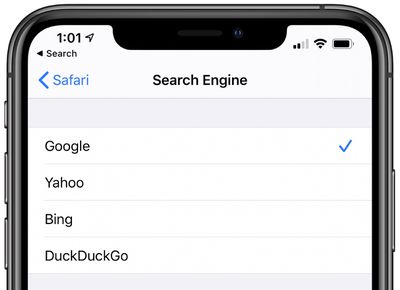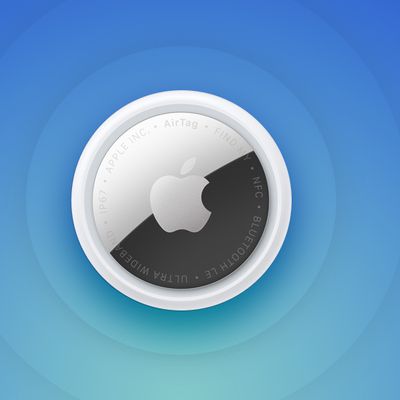UK Regulators Call Google's Search Engine Deal With Apple a 'Significant Barrier' for Competitors
Google pays Apple to be the default search engine on Apple's Safari web browser on iPhones and Macs, which causes a "significant barrier to entry and expansion" for rivals in the search engine market, said the UK Competition and Markets Authority in a report released today (via Reuters).

The relationship between Apple and Google impacts Microsoft's Bing, Verizon's Yahoo, and independent search engine DuckDuckGo. Apple allows users to set these search engines as their default in the Safari settings, a privilege the search engines pay for, but Google Search remains the default on a new device.
Apple received the "substantial majority" of the $1.5 billion (1.2 billion pounds) that Google paid to be the default search engine on various devices in the United Kingdom in 2019, according to the report.
"Given the impact of preinstallations and defaults on mobile devices and Apple's significant market share, it is our view that Apple's existing arrangements with Google create a significant barrier to entry and expansion for rivals affecting competition between search engines on mobiles," the regulators wrote in the report.
UK regulators believe that enforcement authorities should be provided with a range of options to address the arrangement between Apple and Google to provide a more level playing field for other search engines.
Apple could be required to provide "choice screens" that would let users decide which search engine to set as default during device setup, or could be restricted from monetizing default search engine positions, a move that Apple said would be "very costly."
Apple and Google have never confirmed exactly how much Google pays to be the default search engine on Apple devices in the UK, the United States, and other countries, but it's rumored to be in the billions.
Popular Stories
Apple today introduced its first two physical products of 2026: a second-generation AirTag and the Black Unity Connection Braided Solo Loop for the Apple Watch.
Read our coverage of each announcement to learn more:Apple Unveils New AirTag With Longer Range, Louder Speaker, and More
Apple Introduces New Black Unity Apple Watch BandBoth the new AirTag and the Black Unity Connection Braided...
Alongside iOS 26.2.1, Apple today released an updated version of iOS 12 for devices that are still running that operating system update, eight years after the software was first released.
iOS 12.5.8 is available for the iPhone 5s and the iPhone 6, meaning Apple is continuing to support these devices for 13 and 12 years after launch, respectively. The iPhone 5s came out in September 2013,...
Apple today introduced the second-generation AirTag, with key features including longer range for tracking items and a louder speaker.
For those who are not familiar, the AirTag is a small accessory that you can attach to your backpack, keys, or other items. Then, you can track the location of those items in the Find My app on the iPhone, iPad, Mac, Apple Watch, and iCloud.com.
The new...
Update: Apple Creator Studio is now available.
Apple Creator Studio launches this Wednesday, January 28. The all-in-one subscription provides access to the Final Cut Pro, Logic Pro, Pixelmator Pro, Motion, Compressor, and MainStage apps, with U.S. pricing set at $12.99 per month or $129 per year.
A subscription to Apple Creator Studio also unlocks "intelligent features" and "premium...
2026 promises to be yet another busy year for Apple, with the company rumored to be planning more than 20 product announcements over the coming months.
Beyond the usual updates to iPhones, iPads, Macs, and Apple Watches, Apple is expected to release its all-new smart home hub, which was reportedly delayed until the more personalized version of Siri is ready. Other unique products rumored for ...




















